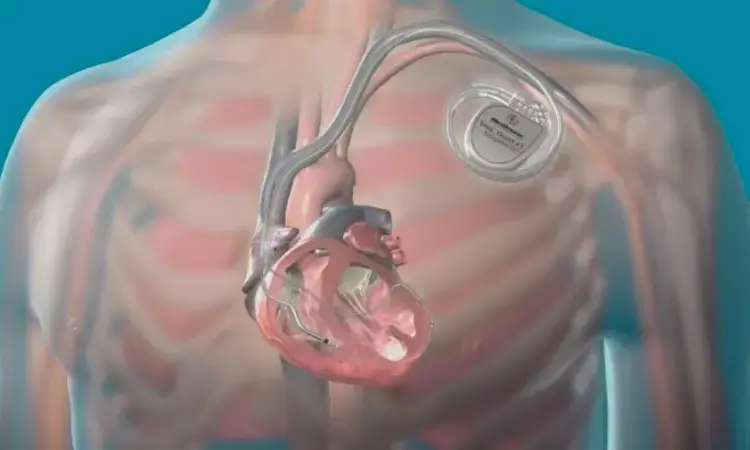- Home
- Medical news & Guidelines
- Anesthesiology
- Cardiology and CTVS
- Critical Care
- Dentistry
- Dermatology
- Diabetes and Endocrinology
- ENT
- Gastroenterology
- Medicine
- Nephrology
- Neurology
- Obstretics-Gynaecology
- Oncology
- Ophthalmology
- Orthopaedics
- Pediatrics-Neonatology
- Psychiatry
- Pulmonology
- Radiology
- Surgery
- Urology
- Laboratory Medicine
- Diet
- Nursing
- Paramedical
- Physiotherapy
- Health news
- Fact Check
- Bone Health Fact Check
- Brain Health Fact Check
- Cancer Related Fact Check
- Child Care Fact Check
- Dental and oral health fact check
- Diabetes and metabolic health fact check
- Diet and Nutrition Fact Check
- Eye and ENT Care Fact Check
- Fitness fact check
- Gut health fact check
- Heart health fact check
- Kidney health fact check
- Medical education fact check
- Men's health fact check
- Respiratory fact check
- Skin and hair care fact check
- Vaccine and Immunization fact check
- Women's health fact check
- AYUSH
- State News
- Andaman and Nicobar Islands
- Andhra Pradesh
- Arunachal Pradesh
- Assam
- Bihar
- Chandigarh
- Chattisgarh
- Dadra and Nagar Haveli
- Daman and Diu
- Delhi
- Goa
- Gujarat
- Haryana
- Himachal Pradesh
- Jammu & Kashmir
- Jharkhand
- Karnataka
- Kerala
- Ladakh
- Lakshadweep
- Madhya Pradesh
- Maharashtra
- Manipur
- Meghalaya
- Mizoram
- Nagaland
- Odisha
- Puducherry
- Punjab
- Rajasthan
- Sikkim
- Tamil Nadu
- Telangana
- Tripura
- Uttar Pradesh
- Uttrakhand
- West Bengal
- Medical Education
- Industry
Nonindicated dual-chamber ICDs implantation for prevention of tied to complications

Israel: Dual - chamber implantable cardioverter - defibrillator (ICDs) are implanted for primary prevention of sudden cardiac death in a majority of patients who do not have pacing indications despite guidelines discouraging it.
Now, a recent study published in the Journal of the American Heart Association has supported an increased risk of periprocedural complications with dual-chamber implantation. The researchers suggest that avoidance of routine implantation of atrial leads will probably improve safety outcomes.
Gilad Margolis, The Ruth and Bruce Rappaport Faculty of Medicine, Technion, Haifa, Israel, and colleagues noted that landmark trials did not show a benefit of dual-chamber pacing in primary prevention ICD implantation, yet it has been practised.
In a 2014 expert consensus document on the ICDs use in patients underrepresented in trials, recent European Society of Cardiology sudden cardiac death guidelines urge the placement of single-chamber ICD when the patient has no other current or anticipated indications for pacing.
Dr Margolis and colleagues conducted the study to investigate the use and safety of single-versus dual‐chamber ICD implantations in these patients.
For this purpose, the researchers identified 15,940 patients who underwent ICD implantation in the US between 2015 and 2019 from the National Inpatient Sample. About 55.6%—received a dual-chamber ICD without having any additional indications for pacing with an atrial lead. Predictors of in‐hospital complications were identified using Multivariable logistic regression.
The study led to the following findings:
- In-hospital complication rates were higher for dual-chamber than for single-chamber ICD placements: 12.8% versus 10.7%, respectively.
- Pneumothorax/hemothorax were the chief drivers of these higher complication rates, occurring in 4.6% and 3.4% of dual- and single-chamber patients, respectively.
- Lead dislodgements were also more common: 3.6% versus 2.3%.
- In multivariate analyses, the dual-chamber configuration was an independent predictor for any complications, pneumo/hemothorax, and lead dislodgement.
"The majority of patients in the US are still implanted with a dual‐chamber implantable cardioverter‐defibrillator (dICD) despite significant evidence for a dearth of clinical benefit in addition to an atrial lead to a primary prevention implantable cardioverter‐defibrillator implantation," the researchers wrote.
The researchers observed an increased risk for complications in dICD recipients compared with sICD implantation, driven by a higher incidence of lead dislodgement and pneumo/hemothorax.
"These data should be considered by professional societies in recommendations formulation, as avoidance of atrial lead implantation in patients who do not need pacing will likely contribute to a significant lowering of procedural complications," they concluded.
Reference:
Margolis G, Hamuda N, Kobo O, et al. Single‐versus dual‐chamber implantable cardioverter‐defibrillator for primary prevention of sudden cardiac death in the United States. J Am Heart Assoc. 2023;12:e029126.
Dr Kamal Kant Kohli-MBBS, DTCD- a chest specialist with more than 30 years of practice and a flair for writing clinical articles, Dr Kamal Kant Kohli joined Medical Dialogues as a Chief Editor of Medical News. Besides writing articles, as an editor, he proofreads and verifies all the medical content published on Medical Dialogues including those coming from journals, studies,medical conferences,guidelines etc. Email: drkohli@medicaldialogues.in. Contact no. 011-43720751


